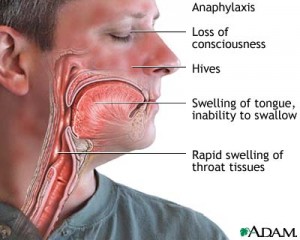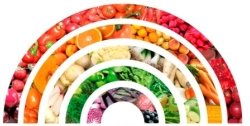According to a study reviewed in Pediatrics and funded by an allergy advocacy group, Food Allergy Initiative, one in every thirteen children will be diagnosed with a food allergy. With these numbers rising, it’s time to take a step back and review the basics to determine where this all began, how to approach food allergies now, and how to prevent (or heal from) food allergies in the future.
What is a food allergy?
A food allergy is when the body becomes hypersensitive to the proteins found in foods like fish, peanuts, tree nuts, shell fish, wheat, soy, and dairy. When you come into contact with one of these proteins orally, or in extreme cases by inhaling spores from those proteins, your body creates a natural antibody to fight off this so-called intruder.
Side Effects from the Body’s Antibody:
- Lightheaded, Dizzy
- Tingling, Itchy Throat
- Hives, Itching, Eczema
- Swelling of Lips, Throat, Face (may have bluish tint)
- Nausea, Vomiting, Abdominal Pain
- Trouble Breathing, Wheezing, Nasal Congestion
- Constricting Airways
- Anaphylactic Shock
Warning: If someone has labored breathing, swells rapidly, and/or becomes unresponsive, call 911!
Now, you may be wondering….
Why would my body create an antibody to something that is supposed to nourish me?
The most well known reason people have allergies is because they genetically inherit it. If both parents are allergic to peanuts, it’s highly likely that their children will be allergic to peanuts.
Another reason could be that a child was introduced to an allergy-inducing food too soon and continually engaged with that food without a clear understanding of the correlation of reoccurring symptoms and allergies; the food could be directly digested or enter through breast milk.
Eating the same foods over and over again may cause the body to become sensitive to it. Think about it this way: If you keep putting gas in your car and you actually need oil too, once the tank is full it just spills out everywhere and the car still won’t run, because you haven’t given it what else it needs to function. Now try to put gas in the oil tank and you’ve got serious mechanical issues.
The body reacts the same way with proteins from these allergy-inducing foods. Give the body too much of one protein and the excess builds up in the stomach potentially causing leaky gut syndrome—which then causes the body to react as if the protein is an intruder, because the excess protein just interfered with the body’s natural digestive process.
So, you can have too much of a good thing.
Processed foods can be are culprits. Compare the ingredients of different types of processed food and you will find the same ingredients listed over and over again, regardless of the brand, type of food, etc… Filling the grocery cart and the stomach unconsciously will inevitably pump the body with the same fuel. Soon, it gets tired and protests, and that’s when the allergic reaction occurs.
Did you know that environmental toxins, chemicals used to increase the shelf life of food products, and chemicals that make up the packaging of those products can wreak havoc on the immune system?
This can cause the body to get confused about what is naturally useful and what’s an intruder, and then the body works against itself by fighting against the proteins it needs while adapting to the chemicals. It’s a vicious cycle that can leave the body exhausted and battling against the wrong ingredients.
How can I prevent or heal from food allergies?
With all the above working against us, it may seem scary, but here are five simple steps to keep the body nutritionally sound.
- Eat the rainbow.
Eating a variety of fruits and veggies, in every color of the rainbow, guarantees that the body gets all the ingredients it needs to be successful.
- Probiotics increase protein absorption.
Organic Greek yogurt or even a probiotic supplement may increase the enzymes in your gut that break down those bothersome proteins.
- Take the two week elimination challenge.
Eliminate the problem by isolating allergy-inducing foods. Start by eliminating foods, one by one, initially beginning with any food that is known to cause an allergic reaction for anyone in your immediate family (e.g. mother, father, brother(s), sister(s), or grandparent(s)). Don’t eat it for two weeks and if the symptoms go away, then you’ve got a solution. If not, repeat the process until you find the offender.
- Keep a food journal.
If you’re not fond of the elimination diet, record daily food intake and make notes when you have allergic reactions. Do this for six to eight weeks and you may be able to identify the problem.
- See a naturopathic doctor.
General practitioners treat the symptom, not the problem. Prescription medications suppress those symptoms, which can increase your allergic response to that particular offender or worse, create more allergies. Naturopathic doctors find the source of the problem and treat the person as a whole, creating harmony in the digestive system and throughout the rest of your body.
Don’t live through one more itchy, scratchy, nauseous day. There may be much ado about allergies, but there’s A LOT you can do too!
Main Sources:
Associated Press-http://hosted.ap.org/dynamic/stories/U/US_MED_FOOD_ALLERGIES?SITE=AP&SECTION=HOME&TEMPLATE=DEFAULT
Food Allergy Initiative- http://pediatrics.aappublications.org/content/early/2011/06/16/peds.2011-0204.abstract?sid=4e5774ee-7958-41ca-a3f4-a5f8360af310
Secondary Sources:
Common Food Allergies- http://www.allergy-clinic.co.uk/food-allergy/food-and-allergy/
Diagnosing Food Allergies in Children- http://www.oprah.com/health/Diagnosing-Food-Allergies-in-Children
Enzymes and Food Allergies- http://www.healthiertalk.com/enzymes-and-food-allergies-3872
Food Allergies and Allergy Symptoms- http://babyandkidallergies.com/index.php
The Food Allergy & Anaphylaxis Network- http://www.foodallergy.org/
Mayo Clinic’s Food Allergy: Symptoms- http://www.mayoclinic.com/health/food-allergy/DS00082/DSECTION=symptoms
Natural Solutions- https://carolinasnaturalhealth.com/PDFs/allergysmith.pdf



